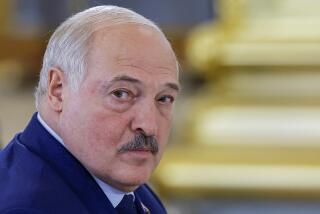Violence follows Belarus election
Reporting from Moscow — After 16 years in office, Belarus President Alexander Lukashenko appeared headed for another five-year term in a controversial election Sunday that was quickly followed by violent late-night street clashes and accusations of vote fraud from human rights groups.
Final results announced by the state’s central election commission indicated that the autocratic 56-year-old leader, who adheres to a bygone Soviet economic model, received 79.7% of the vote, after 100% was counted.
Opposition leaders called on their supporters to launch a protest in downtown Minsk’s Oktyabrskaya Square before firm results were announced. Candidate Vladimir Neklyayev said he and supporters were ambushed on the way to the square and beaten by masked riot police.
“They blocked the street with a traffic police car and attacked us on all sides, wearing black uniforms and black masks,” Neklyayev, of the Speak the Truth movement, said in a phone interview. “They beat me up on the head with a stick two times and when I went down they continued kicking me with their boots.”
“I lost consciousness for a little while and when I came to I felt blood pouring all over my face,” he added. “Then one of them kneeled near me, felt the pulse in my wrist and said: ‘He will live.’ ”
The Belarusian Interior Ministry reported that unarmed officers were attacked by a drunken crowd and injured, according to the Interfax news agency.
Several thousand protesters who reached the square chanted anti-Lukashenko slogans and some were arrested by police when they hurled rocks and smashed windows at government buildings.
A source in the Interior Ministry told Interfax that at least two presidential candidates were arrested as riot organizers. Neklyayev’s wife told the news agency that her husband was taken away by police from the hospital.
The election commission said the vote count was slowed because electricity was switched off and personnel evacuated from its building during the protest outside.
After the previous presidential election in 2006, thousands of opposition supporters gathered in the square, erecting tents and defying the authorities for days. On the eve of this election, Lukashenko’s administration turned the square into a public skating rink — peopled by pro-government youth groups. Neklyayev called on his supporters to go to the square with pockets full of salt or sand.
Human rights activists said they were particularly suspicious of advance voting procedures, in which more than 24% of about 7 million votes were cast. This former Soviet republic has a population of about 10 million.
“Soldiers, students, factory and farm workers all voted ahead of time and we can only guess what instructions they were given,” Valentin Stefanovich, an election monitor and deputy head of the human rights group Vyasna, said in a phone interview with The Times.
“The election has nothing to do with democracy and I can say with confidence now that its results are completely falsified,” said Neklyayev, 64, a popular Belarusian poet.
Andrei Sannikov, another presidential candidate, leader of the European Belarus movement and former deputy foreign minister, also questioned the fairness of the election before his phone line went dead. The Interior Ministry later confirmed that he was arrested.
Some analysts said Lukashenko is actually very popular, particularly in rural areas, and was poised to win even if not by a landslide.
“Lukashenko is cunning and his success is built on populism and social politicking,” said Roman Yakovlevsky, an independent Belarusian political analyst. “That is how he balances his famed social stability — paying social benefits, pensions and budget employees’ salaries on time” by using Russian oil money and Western financial credits, Yakovlevsky said.
Early in the month, Lukashenko returned from Moscow with a $4-billion, tax-free oil deal.
“I voted for Lukashenko because I don’t know much about these other nine people” on the ballot, said Vitaly Zayko, 54, a factory worker. “Lukashenko takes good care of the people and he is a simple man like one of us.”
More to Read
Sign up for Essential California
The most important California stories and recommendations in your inbox every morning.
You may occasionally receive promotional content from the Los Angeles Times.










